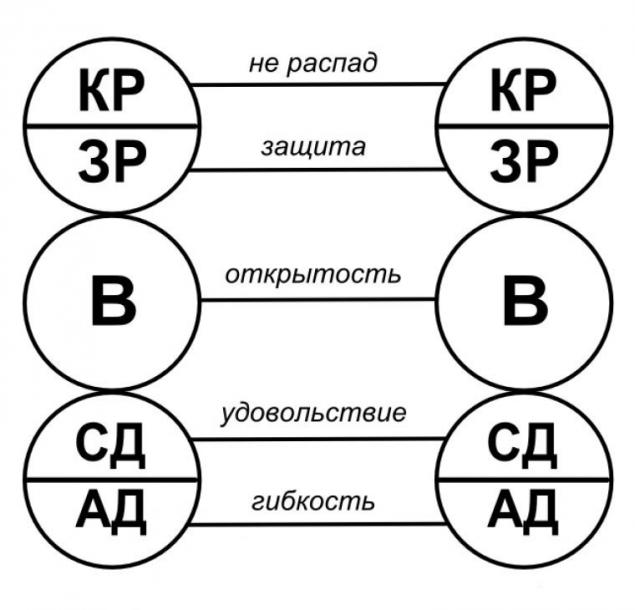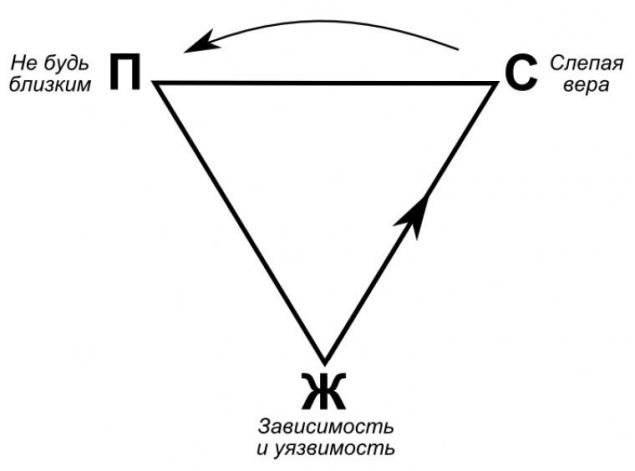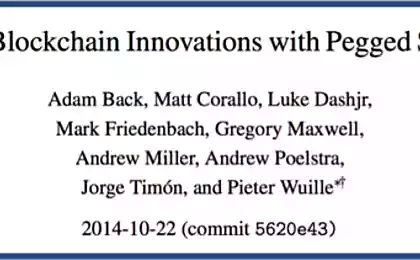462
How to save a relationship: 5 pairs of contracts according to Karpman
To maintain and improve relations in the pair is possible with the conclusion of the 5-year "contracts of confidence":
Contract No. 1.
The controlling parent:
contract the"non-collapse". The couple agrees to maintain structure and personal standards in relationships and to refrain from unexpected "debris" such as:

In the absence of such a contract, the person may say: "I am free to take any decision".
Contract No. 2.
Doting parent: the contract of "protection". Partners agree to protect each other from unnecessary anxiety and pain in anticipation of stressful situations in advance by providing support and information. Partner frees the other from morbid jealousy, shame, excessive anger and uncertainty, mindful of his weaknesses and restraining when necessary.
In the absence of such a contract, the person said: "You'll have to deal with their feelings."
Contract No. 3.
Adult: the contract on the"openness". Partners agree to discuss all the differences, preferably on the day of their occurrence. In the conversation partners agree not to use a condescending tone, not to kill each other, not to conceal and not to deviate from the topic, and also to carry the three rules of openness:
To raise the issue;
To discuss (negotiate);
To close the topic;
In the absence of such a contract, a person says: "I'm not obliged to tell you".
Contract No. 4.
Free child: the Contract of "on pleasure". Partners agree to give each other pleasure:
-sex, asking a partner and agreeing to do what pleases another, without clearing the "don't tread on me, I'm going to."
-in a joint pastime, agreeing to visit new places at the whim of a partner.
-in his own individuality, opening another new, unexpected side of his personality, thereby breaking the routine predictability of the relationship.
In the absence of such a contract, the person said, "We both can have fun in their own way".
Contract No. 5.
Adaptive child: the Contract of"flexibility". Partners agree on a spontaneous willingness to give in arising disputes, even being sure of the correctness, for the sake of peace.
The opposite of flexibility is a tough stance: "I'm not going to change your lifestyle for the sake of someone else".
In the absence of such a contract, the person said: "it Seems we have different views on things."

It is necessary to distinguish the trust from "blind faith", which occurs when:
The contract is in the absence of actual trust between partners;
The contract is considered concluded, without clear clarification of mutual expectations;
The contract is treated as remaining in force after the start of the breakup;
Means perfect a contract, without a single error.
The victim will confirm parent order "Not be close", expecting blind faith from the saver that hurts and disappoint her, turning Stalker. published

© Stephen Karpman
P. S. And remember, only by changing their consumption — together we change the world! ©
Source: www.psyclass.ru/pyat-kontraktov-doveriya-dlya-par
Contract No. 1.
The controlling parent:
contract the"non-collapse". The couple agrees to maintain structure and personal standards in relationships and to refrain from unexpected "debris" such as:
- to quit work and "hang" on the partner;
- constantly threaten to break off relations;
- to abandon their earlier commitments;
- suddenly to neglect the integrity, order, or hygiene.

In the absence of such a contract, the person may say: "I am free to take any decision".
Contract No. 2.
Doting parent: the contract of "protection". Partners agree to protect each other from unnecessary anxiety and pain in anticipation of stressful situations in advance by providing support and information. Partner frees the other from morbid jealousy, shame, excessive anger and uncertainty, mindful of his weaknesses and restraining when necessary.
In the absence of such a contract, the person said: "You'll have to deal with their feelings."
Contract No. 3.
Adult: the contract on the"openness". Partners agree to discuss all the differences, preferably on the day of their occurrence. In the conversation partners agree not to use a condescending tone, not to kill each other, not to conceal and not to deviate from the topic, and also to carry the three rules of openness:
To raise the issue;
To discuss (negotiate);
To close the topic;
In the absence of such a contract, a person says: "I'm not obliged to tell you".
Contract No. 4.
Free child: the Contract of "on pleasure". Partners agree to give each other pleasure:
-sex, asking a partner and agreeing to do what pleases another, without clearing the "don't tread on me, I'm going to."
-in a joint pastime, agreeing to visit new places at the whim of a partner.
-in his own individuality, opening another new, unexpected side of his personality, thereby breaking the routine predictability of the relationship.
In the absence of such a contract, the person said, "We both can have fun in their own way".
Contract No. 5.
Adaptive child: the Contract of"flexibility". Partners agree on a spontaneous willingness to give in arising disputes, even being sure of the correctness, for the sake of peace.
The opposite of flexibility is a tough stance: "I'm not going to change your lifestyle for the sake of someone else".
In the absence of such a contract, the person said: "it Seems we have different views on things."

It is necessary to distinguish the trust from "blind faith", which occurs when:
The contract is in the absence of actual trust between partners;
The contract is considered concluded, without clear clarification of mutual expectations;
The contract is treated as remaining in force after the start of the breakup;
Means perfect a contract, without a single error.
The victim will confirm parent order "Not be close", expecting blind faith from the saver that hurts and disappoint her, turning Stalker. published

© Stephen Karpman
P. S. And remember, only by changing their consumption — together we change the world! ©
Source: www.psyclass.ru/pyat-kontraktov-doveriya-dlya-par























